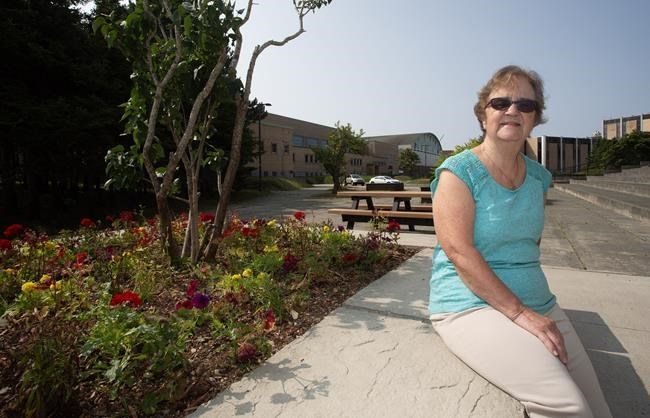
Marilyn Butt poses for a photograph on the campus of Memorial University in St. John’s on Friday, August 16, 2024. THE CANADIAN PRESS/Paul Daly
Republished August 20, 2024 - 2:59 PM
Original Publication Date August 18, 2024 - 3:06 AM
ST. JOHN'S, N.L. - For decades, folklorists at Memorial University have had a Mrs. W. R. King to thank for sharing the local superstition that a lid left off a kettle as tea was steeping was a sure sign a stranger would soon come knocking.
But it was not until a project dubbed Missus Monday took off that researchers at the Newfoundland and Labrador university were able to put a full name to their mysterious source. They now know Mrs. King's first name was Myrtle, and she worked as a switchboard operator in St. John's, N.L.
The project of the university's Folklore and Language Archive aims to find the first names of women who contributed remedies, recipes and local beliefs, but were only credited as a "missus," with their husband's last name and often his first name or initials. Nicole Penney, an assistant archivist at the centre said men and unmarried women had their first and last names included, but the tradition was to identify married women with their husbands' names.
"We wanted to put it out there that these women had lost their names, basically," Penney said in a recent interview. "They're all amazing pieces of folklore, and these women deserve the recognition."
From fairies that lure berry pickers over cliffs to "charmers" that can heal toothaches, Newfoundland has a rich folklore tradition that began with the English and Irish fishermen who began settling on the island in the 17th century. Fascinated, an American anthropologist named Herbert Halpert established the folklore archive at Memorial in the 1960s.
Researchers and students began collecting tidbits from people across the province, writing them down on index cards along with the name of who supplied them and where they were from. Over the next three decades, more than 120,000 cards were filled out with wisdom and anecdotes from many of the far-flung fishing villages dotting Newfoundland and Labrador's shores. The cards now sit in a towering filing cabinet at the archive office in St. John's, organized chronologically in 25 drawers, Penney said.
The cards map out the beliefs, expressions and rituals that informed everyday life in these communities, helping scholars better understand the social history of the province.
Mrs. Lloyd Head of Carbonear said a spruce bough tied to a gatepost would ward off evil spirits and keep crops safe, according to a card from 1977. Mrs. L. Hynes of Bishop's Falls would make cough drops she called "bull's eyes" by boiling together molasses and Vicks VapoRub, according to another, from 1984.
Mrs. M. E. Breen in St. John's heard it was good luck to blow a kiss to a crow, said a card from 1985.
In 2019, wanting to know who these women were, staff at the folklore archive began posting the cards to Facebook and Twitter (now known as X), asking if anyone might be able to identify the "missus" in question. They posted the cards on Monday, and called the effort Missus Monday.
So far, they've posted 165 cards, and identified 21 contributors, she said.
Last year, Marilyn Butt saw a Missus Monday post about a Mrs. Thornhill, who said people would describe dancing as "(putting) the leather to the lumber" in Pool's Cove, N.L., a remote community of about 150 people along the southern shore of Newfoundland.
Butt is from Pool's Cove, too, and she's part of a Facebook group where residents past and present collect information about their roots in the community. With help from group members, she was able to confirm that the dancing missus in question was Rhoda Thornhill, who died in 2015, at the age of 92.
"Rhoda's husband and my dad are first cousins," Butt said in an interview, adding that Thornhill was "very musical." She's happy Rhoda Thornhill will get proper credit for her contribution to the province's folklore history.
Penney said she plans to keep the Missus Monday project going for as long as she can.
"We know that we're not going to identify all these women, but we want to just put it out there. It's good to know who they are and give them their credit," the archivist said.
"These women's names might have been completely lost had it not been for this."
This report by The Canadian Press was first published Aug. 18, 2024.
News from © The Canadian Press, 2024